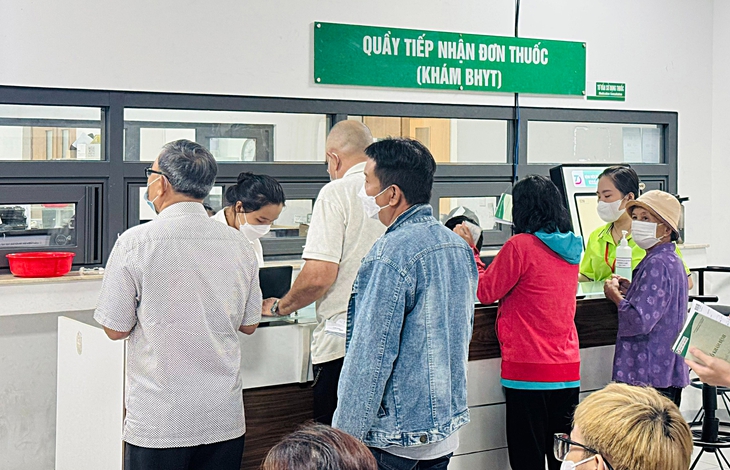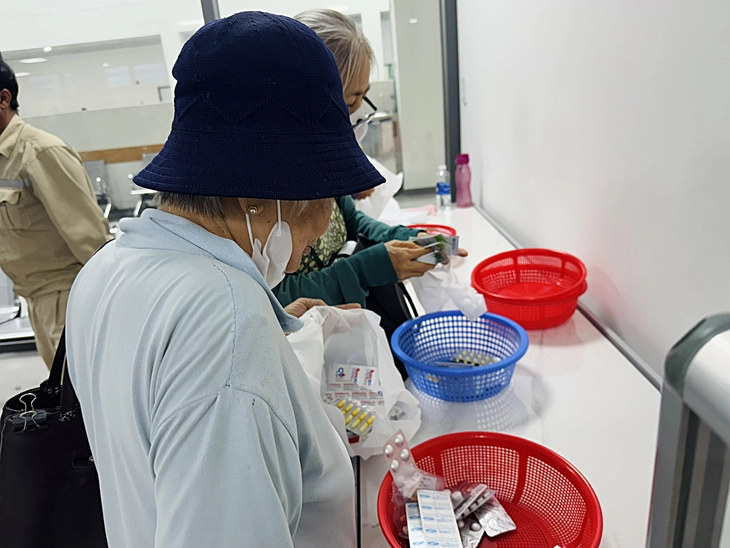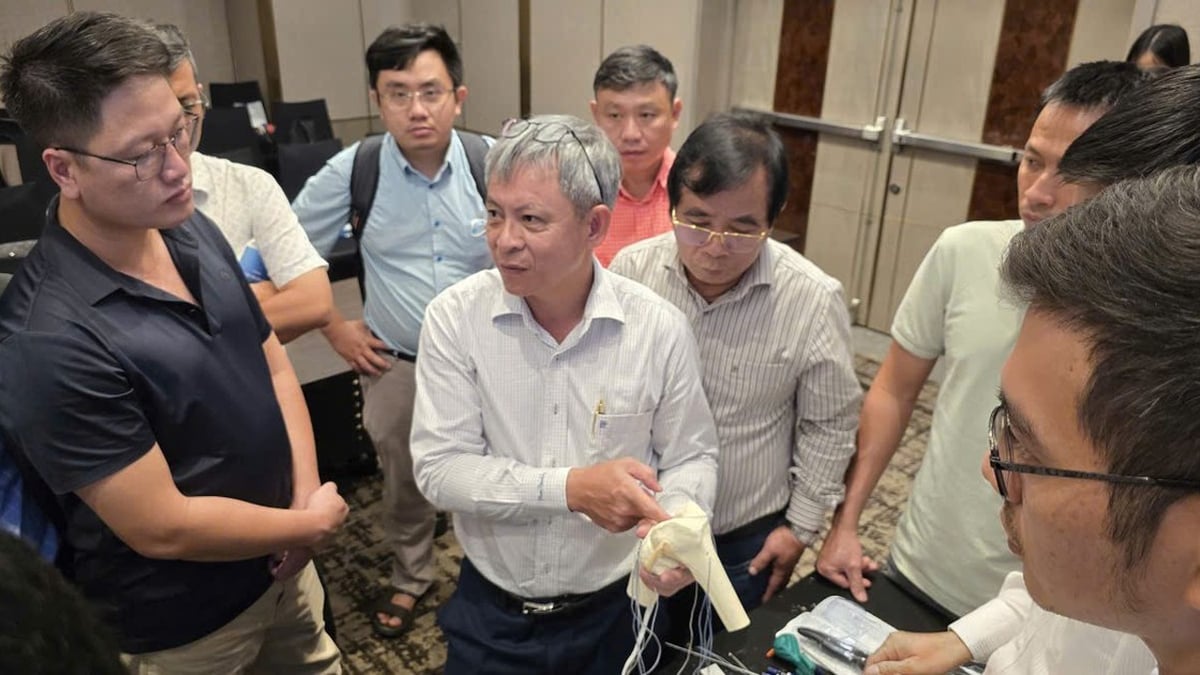
Chronic patients line up at Thu Duc Regional General Hospital to wait for their turn to get monthly health insurance medicine - Photo: THU HIEN
This story is happening in many hospitals, where every day they have to receive hundreds, thousands of chronic patients waiting in line to get medicine, while the time for re-examination is very limited or only general questions are asked, this causes a lot of trouble for patients and overloads the medical facilities.
The suffering of the chronically ill
According to Tuoi Tre , at 8am on May 29, at the health insurance drug dispensing area of Thu Duc Regional General Hospital (HCMC), there were many people lining up to wait for their names to be called to get medicine. Most of them were elderly people with chronic diseases such as high blood pressure, diabetes...
Many elderly people are fed up with having to go to the hospital every month to get medicine, the medicines are basically the same as the previous month. It is worth mentioning that patients only need to do tests to check their health every 3-6 months.
Ms. NTT (80 years old, Thu Duc City) said she has had diabetes since 2016, for nearly 10 years now she has had to go to the hospital every month to get medicine. Being old, it is difficult to move around, every time she goes she has to have a family member accompany her.
"Every 21 days I have to go to the hospital to get medicine. I start at 7am. Even though I'm older, I get priority. But sometimes I don't finish until 12am. And sometimes I wait so long that I can't get the medicine.
Most of the medicine is the same as last month, but I still have to go to the hospital regularly, and the tests are only done every 3 months. Once I asked the doctor to extend the medicine, but he said no because it was the rule. I hope the doctor will extend the medicine so it will be less difficult," Ms. T. confided.
In Hanoi , in the hallway of an internal medicine clinic, Ms. Hong (63 years old, in Ha Dong district) came for a routine check-up for diabetes and high blood pressure. She waited for nearly 2 hours, but her medical examination only lasted 3 minutes. The doctor flipped through her medical records, asked "Are you taking your medication regularly? Are there any unusual symptoms?" and then re-prescribed the same prescription as last month.
"I didn't get tested or change my medication, it still took me all morning, I had to take a bus from early morning until noon to finish," said Ms. Hong, holding the prescription she knew by heart.
Stories like Ms. Hong's are not uncommon. Mr. Hoa (75 years old, a veteran in Hanoi) still comes for a monthly heart check-up, even though his health is stable and he has adequate health insurance.
"Every time we have to have our blood tested, have an electrocardiogram, wait for an examination, then wait for medicine. The hardest part is for old people like me, who have difficulty walking, and if we don't walk, we won't have medicine to take," Mr. Hoa lamented.
According to the reporter's records, many patients with chronic diseases such as diabetes, high blood pressure, arthritis... are having to go through the same medical examination process as new patients: taking a number, seeing a doctor, doing tests (if any) before being given medicine, most of which remain unchanged for a long time.
With a large number of patients, each step requires waiting, some people spend up to half a day just to perform the same procedure every month, every year and the prescription does not change much.
Many diseases can be treated with longer-term medication, making it less difficult for patients.
During the COVID-19 outbreak, the Ministry of Health issued guidelines to extend the time to provide medication for chronic patients who have been treated stably to 2-3 months. After the pandemic, many experts found that this "model" was effective, beneficial for both patients and hospitals.
After that, Vietnam Social Security proposed the Ministry of Health to allow the drug supply period to increase to a maximum of 90 days. Patients who are not yet stable will still have monthly check-ups, but those who have been treated stably can receive drugs for a maximum of 3 months/time, instead of less than 1 month as at present.
Xanh Pon General Hospital piloted long-term medication from November 2024 to the end of April 2025, providing over 30 days of medication to about 2,300 patients. The number of patients receiving long-term medication tends to increase every month.
The results showed that the rate of patients who had to return for a check-up within 50 days (equivalent to nearly 2 months) after being prescribed medication for more than 30 days was only about 3%. The main reasons included the appearance of side effects, unwanted reactions requiring dose adjustment or drug change, or the emergence of unusual symptoms such as hypertensive crisis, glucose fluctuations in diabetic patients.
Some chronic disease groups such as hypertension, type 2 diabetes, dyslipidemia, chronic hepatitis B, osteoarthritis, and Parkinson's are considered suitable for long-term drug administration.
"This policy has contributed to significantly reducing the frequency of patients coming to the hospital, especially during peak hours such as 8-10am and 1-3pm, thereby improving the convenience of professional work in the examination departments," said a representative of Xanh Pon Hospital.
Accordingly, doctors also determined that the criteria for selecting patients to receive medication for more than 30 days requires a stable condition for at least 3-12 months depending on the disease group, helping to ensure safe treatment, while limiting the risk of complications due to lack of medical supervision, contributing to supporting the management of chronic diseases.
Need flexibility for patients

Many people with chronic diseases say they have to go to the hospital every 21 days to get medicine, while they only get tested every 3-6 months - Photo: THU HIEN
Monitoring and providing medication to chronically stable patients in a reasonable manner not only reduces the burden on upper-level hospitals but also helps patients save time and effort.
In addition, medical experts believe that there needs to be more solutions such as updating medical software to identify stable patients, allowing refilling of medication via apps or remote consultation with doctors. At the same time, improving the quality of primary health care to create trust, patients can be treated for chronic diseases right at the commune health station. This is also a long-term solution so that patients no longer have the mentality of "having to go to the last line" to feel secure.
Doctor Nguyen The Vu, director of District 7 Hospital (HCMC), said that patients with chronic diseases visiting the hospital account for about 60%. The hospital is planning to extend the time to provide chronic disease medication to 60 days for elderly patients who are unable to move or elderly people living alone to reduce their hardship.
According to Dr. Vu, extending the time of drug dispensing to 60 or 90 days is necessary to avoid causing inconvenience to patients. However, extending the time of drug dispensing must be accompanied by a thorough examination by the doctor and assessment of the patient's condition. In cases where the disease has stabilized, the time can be flexible because the disease progression of the elderly can easily become severe.
The leaders of the Health Insurance Department (Ministry of Health) agreed with the proposal to provide medicine every 2-3 months for chronic patients whose treatment has stabilized. Vietnam Social Security also proposed this option.
The Department of Medical Examination and Treatment (Ministry of Health) - also the unit that drafted Circular 52 on prescribing chemical drugs in outpatient treatment - said that it is consulting with experts and professional councils to amend the decree. Whether or not to extend the time for dispensing drugs needs to be carefully considered to ensure good control of chronic diseases for patients.
Chronically ill people are still waiting for a change in prescription times, so that every month they don't have to go to the hospital to queue and... pick up the same old prescription.
Source: https://tuoitre.vn/xep-hang-cho-dai-co-lay-thuoc-benh-man-tinh-20250602062258172.htm


































































































Comment (0)